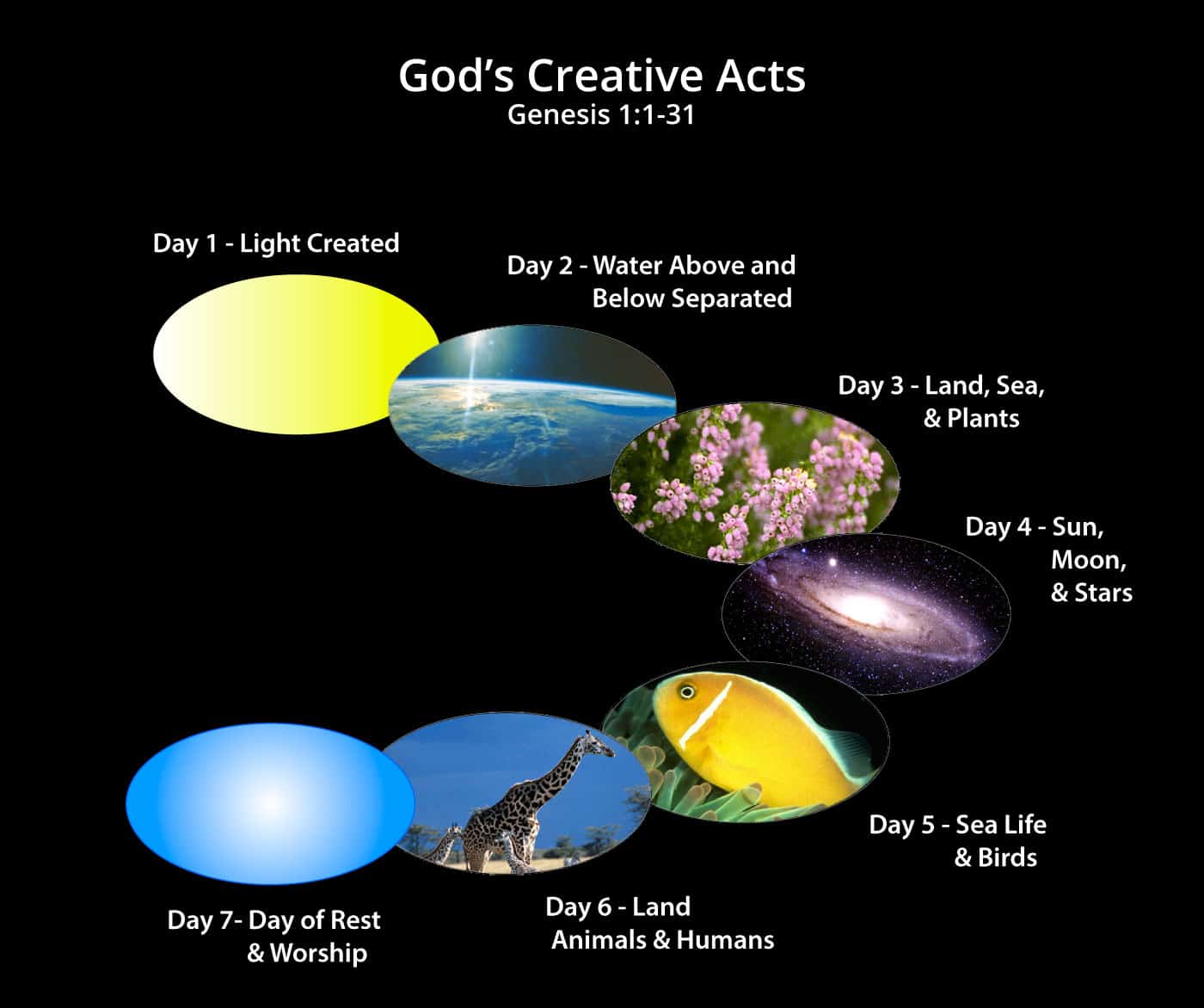
By the word of the LORD the heavens were made,
And by the breath of His mouth call their host.
He gathers the waters of the sea together as a heap;
He lays up the deeps in storehouses.
Let all the earth fear the LORD;
Let all the inhabitants of the world stand in awe of Him.
For He spoke, and it was done;
He commanded, and it stood fast. Psalm 33:6-9 (NASB)
Ever wonder how the universe came into existence? Others have! There are ancient creation stories that reveal men and women have always wanted to know. People today are still asking that question because we want to know where we came from and why we are here.
Most of us laugh at many of the ancient creation stories. Most of them assume that one or more gods existed, but from there the stories are very different. One of the stories comes from people who live in southern Mali. They believe that the world was created by Mangala. Mangala was a powerful being who was composed of a variety of things, including twins. One was female and one was male. Mangala took seeds from the twins and put them into an egg. Inside the egg the seeds grew into fish. One of the fish, named Pemba, became ambitious and aggressive. He eventually threw some of the womb’s placenta down. That piece became the earth. The story continues with the creation of two tribes. One became farmers and the other was aristocratic.
In the Shinto religion, there are several creation stories. One of the stories teaches that the In and Yo initially formed an egg. As time went by, heaven and earth separated within the egg. The heavier and grosser part settled down, leaving the purer and clearer above. The heavier part eventually became the earth, and purer part became the heaven.
The Hindu religion has a creation story which teaches that Indra, king of the gods, and Vishnu, god of rain, created heaven from earth when the sun rose from the navel of the earth and a pillar was erected.
Another story cannot explain how anything came into existence, but says that once “something” exploded and the universe was formed. Within that universe balls of gas and debris raced into the blackness and became rock, water, and something began to grow in the slime. Eventually, a living sea creature came into existence in the water. One day it crawled upon the earth and became different animals and eventually a man and woman. That myth says that we became animals by random chance. They claim that this occurred over billions of years, but there is no proof. That is their creation myth.

In the Beginning God Created
The Bible does not describe such fanciful stories of the beginning of the universe of our world. The first verse of the book of Genesis is simple. It says that God exists and He created everything.
In the beginning God created the heavens and the earth. Genesis 1:1 (NASB)
With the existence of an all-powerful God, the verse is logical and what follows is rational. Genesis 1 says that God created the universe and the world in six days. The Hebrew word for “day,” yohm, in the chapter refers to a twenty-four hour day (see “Six Days or Billions of Years?”). This helps us understand that God created the universe in six twenty-four hour days. Instead, God created the universe suddenly and with maturity. The trees, shrubs, flowers, grass, and the animals were full-grown. This is called “Sudden Creationism.”
Now answer these questions and discover what God did.
1. How did God design the earth according to Job 26:7?
2. What shape did God give to the earth according to Isaiah 40:22?
3. What does Job 9:5-11 reveal about God and what He did?
Thomas Henry Huxley stated, “The great tragedy of science is the slaying of a beautiful hypothesis by an ugly fact.” The point of the article is that the theories of science are constantly changing. Only God knows absolute truth.
4. On what days did God create the world’s land and sea and the stars and suns of the universe (Genesis 1:1-31)?
5. On what days did God create the animals that live on the sea, in the air, and on the land (Genesis 1:1-31)?
6. On what day did God create man (Genesis 1:1-31)?
7. What does the creation reveal according to Psalm 19:1 and Romans 1:20?
8. How should we respond to what we see and learn about the creation (Romans 1:21-23?
Creation of Man
We have learned how God created the universe and our world. He created everything that exists in the universe. Now let’s discover what God did when He created Adam and Eve. How did God create men and women (Genesis 1:26-27; 5:1; 9:6; 1 Corinthians 11:7; James 3:9)?
To say that Adam was made in the image of God means that he 1) had intellect, 2) had emotion, 3) was able to have a relationship with God and others, and 4) could perform many different tasks. Isaiah 43:7 says that God made us for His glory. Now let’s answer these questions so that we can discover what Scripture teaches about men and women.
1. Now draw a line between the following characteristics and the correct verse. You will discover how people and God are alike.

2. What does Hebrews 4:12 reveal about people?
3. What was man like when he was created, according to Ecclesiastes 7:29?
When God created mankind He made them like Himself in many ways. He created the ultimate in masterpieces. That helps us understand why we were so marvelously created. As a result, King David wrote this psalm.
For you formed my inward parts;
You knitted me together in my mother’s womb.
I praise you, for I am fearfully and wonderfully made.
Wonderful are your works;
My soul knows it very well.
My frame was not hidden from you,
When I was being made in secret,
Intricately woven in the depths of the earth.
Your eyes saw my unformed substance;
In your book were written, every one of them,
The days that were formed for me,
When as yet there was none of them.
Psalm 139:13-16 (NASB)
The Fall of Man
Sometime after Adam was created, God warned Adam that if he ate the fruit of the tree of knowledge of good and evil, he would die. What did God tell Adam in Genesis 2:16-17?
This was a test of Adam’s commitment to God. Just as in any family or friendship, one’s faithfulness to another is always the real test of one’s love in a relationship. Jesus told His disciples, “If you love Me, you will keep My commandments” (John 14:15). Jesus’ statement reveals that people who are committed to a relationship will love one another. God was already committed to Adam because He loved Adam and Eve. 1 John 4:8 and 16 says that God is love. This implies commitment and faithfulness. But in Genesis 3, we discover that Satan was able to motivate Eve to doubt God. He motivated Eve to doubt that God really loved her. How did Satan motivate Eve to disobey God, according to Genesis 3:1-5? There are at least two answers.
Genesis 3:6 tells us that Eve disobeyed God by eating of the fruit. We do not know what kind of fruit she ate, since scripture never tells us – that is not important. The most important information is that Satan was successful and Eve disobeyed God.
So when the woman saw that the tree was good for food, and that it was a delight to the eyes, and that the tree was to be desired to make one wise, she took of its fruit and ate, and she also gave some to her husband who was with her, and he ate. Then the eyes of both were opened, and they knew that they were naked. Genesis 3:6-7 (NASB)
What does 1 Timothy 2:14 reveal about Eve and Adam when they ate of the fruit?
When Adam ate the fruit of the tree of the knowledge of good and evil, sin entered the entire creation and the human race. Romans 8:20-22 tells us that the creation was also corrupted when Adam sinned. This is called “The Fall.”
1. How many people sin and will die because Adam sinned according to Romans 5:12?
2. What is sin according to Romans 5:19 and 1 John 3:4?
3. Romans 5:19 says that when Adam sinned we became sinners. What is the proof that we are also sinners (Romans 3:23)?
4. What does Psalm 14:3 and Romans 3:9-12 reveal about man?
5. Write down at least twelve sins that are mentioned in Romans 1:28-31; Galatians 5:19-21, and 1 Corinthians 6:9-10.
6. Because we sin, what do we deserve according to Romans 6:23?
Our Condition
God is very clear in the scriptures that we are sinners. Some folks consider themselves to be good people who sometimes make mistakes. However God has a different view. There is an old statement that says we are sinners because we sin. The truth is we sin because we are sinners. We are not good people who happen to sin. We sin because we are unholy people. We are born sinners. The following questions will help us understand this truth better.
1. How were we born, according to Psalm 51:5?
2. At the moment of birth, what are we like according to Ephesians 2:1-3?
3. If you say you do not sin, what are you according to 1 John 1:8, 10?
4. Can we blame someone else for our sins according to James 1:13-16? Why do we sin?
5. When we sin, whom do we offend, according to Ephesians 4:30 and 1 Thessalonians 5:19?
Things To Ponder
1. Please write a definition of sin.
2. Have you ever committed murder, according to Matthew 5:21-22?
3. Do you consider yourself to be a sinner? Why?
4. Which sins have you committed in the list given in Galatians 5:19-21?
5. How can we have our sins forgiven according to Mark 2:7; Luke 24:45-47 and Acts 13:38-39?
6. What happens when you believe in and trust Jesus to forgive your sins (Romans 5:1)?
7. 1 John 1:1-3 says that something wonderful occurs in our relationship with God when we believe in Jesus. What is it?
8. Would you like to have your sins forgiven?
Suggested Links:
Introduction To Solid RootsWhat Is The Bible? – revelation, inspiration, and inerrancy
Overview of the Books of the Bible – themes and descriptions
How to Study the Bible Step-by-Step
Who Is God? – trinity, and His attributes
Jesus Our Savior – God-man, death, resurrection, and ascension